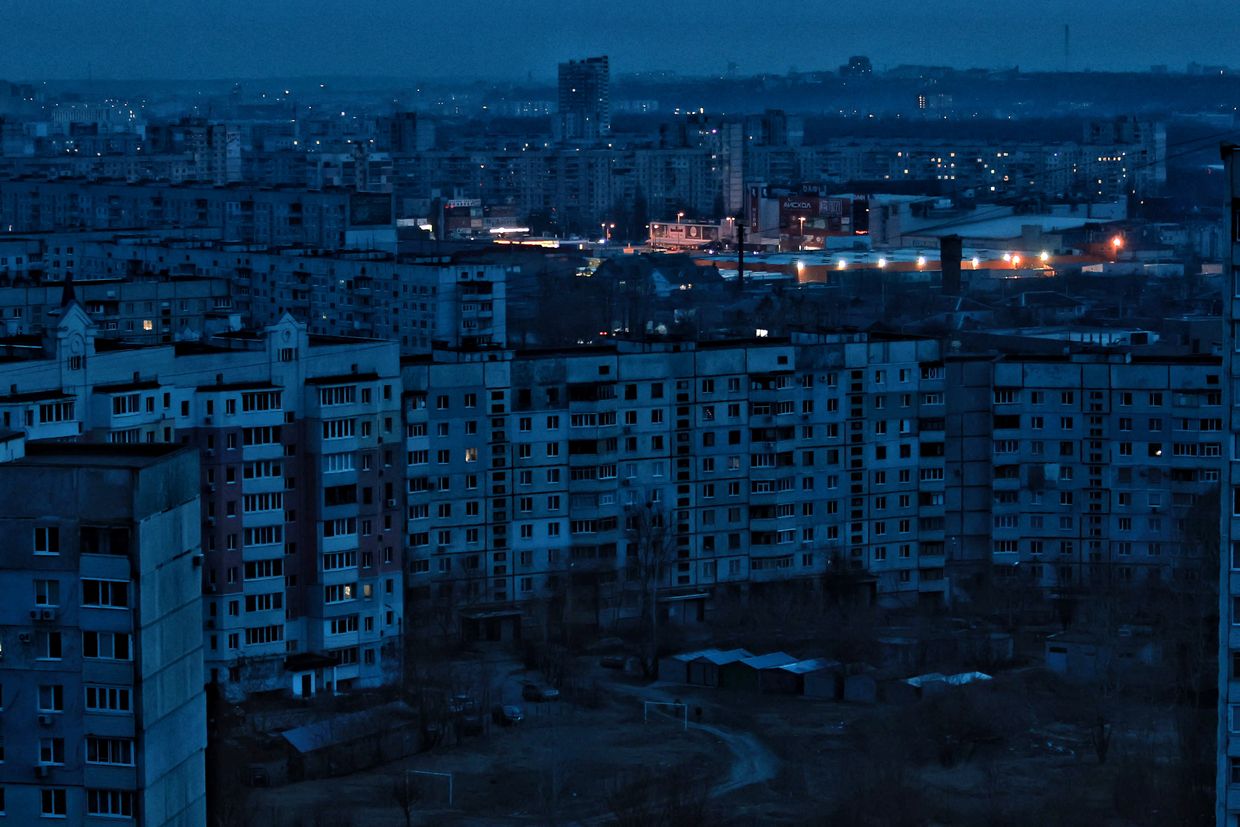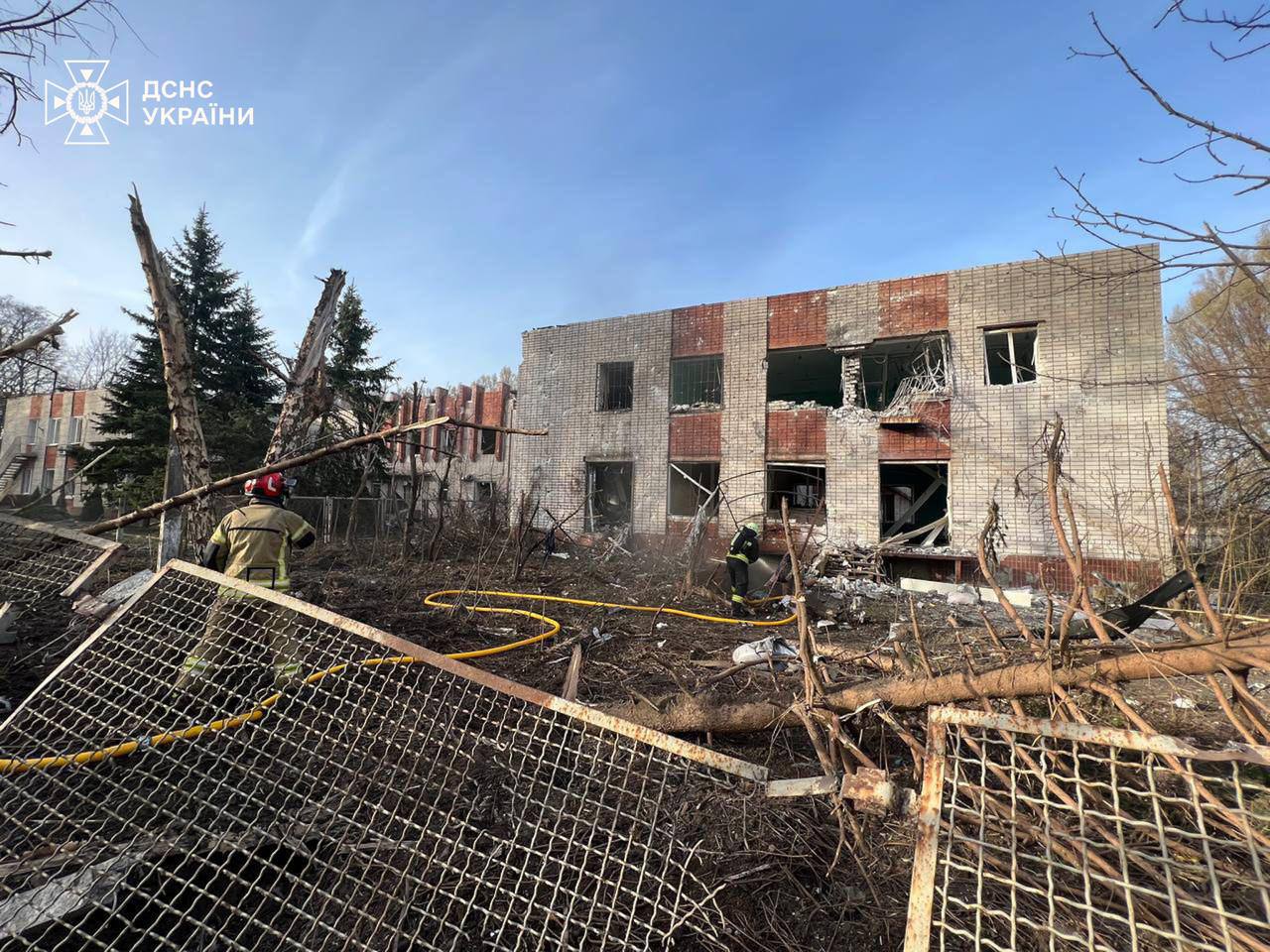Daily Flyer - April 1-2, 2024
A voice of Ukraine to the West

Russia may focus its potential offensive only in one operational direction
In their April 1 report, the Institute for the Study of War (ISW) has highlighted potential developments in Russia's strategy concerning a late spring or summer offensive against Ukraine, particularly focusing on the western part of Donetsk Oblast.
The ISW speculates that the Russian military command might prioritize the area near Avdiivka, a strategically significant city captured by Russia in February. One notable indication is Russia's readiness to deploy a battalion of tanks for a potential offensive in this region.
Citing an unnamed Ukrainian service member, the ISW reports that on March 30, Ukrainian Armed Forces seemed to successfully repel the first battalion-sized mechanized assault by Russia since the commencement of Moscow's campaign to seize Avdiivka in late October 2023.
According to assessments by both the ISW and the U.K. Defense Ministry, Russian troops may have deployed 36 tanks and 12 infantry fighting vehicles near the village of Tonenke, presumed to have been captured by Russian forces. However, the Ukrainian military has not officially confirmed this claim.
Despite the challenges faced during the assault, the ISW notes the Ukrainian forces' adept defense against a large-scale Russian attack in a critical area. This demonstrates the potential effectiveness of Ukrainian forces when adequately equipped.
Oleksandr Syrskyi, Commander-in-Chief of Ukraine's Armed Forces, has warned of a possible Russian attack on Kharkiv, which has witnessed increased strikes in recent weeks.
Meanwhile, the situation near the village of Robotyne in Zaporizhzhia Oblast remains tense, with the contact line experiencing fluctuations. However, the Ukrainian military assesses the situation as not critical despite Russian assaults in the area.
While there have been warnings about the accumulation of Russian forces in various parts of the front, the ISW suggests that Russia might concentrate its efforts on a single sector due to manpower and planning constraints.
President Volodymyr Zelensky has acknowledged that the battlefield situation has stabilized compared to previous months but has not ruled out the possibility of a major Russian offensive toward the end of May or in June.
Johnson says vote on Ukraine aid will be held 'right after' Easter recess
House Speaker Mike Johnson announced on March 31st that the U.S. Congress would finally hold a vote on aid for Ukraine, breaking months of deadlock, with the decision set to occur after the Easter holiday ends on April 7th.
The delay in U.S. aid to Ukraine has been a contentious issue since fall 2023, marked by internal disagreements within Congress. Despite bipartisan support for a $95 billion aid package to Ukraine, Israel, and Taiwan passed by the Senate in February, Johnson has refrained from bringing it to a vote in the Republican-led House.
Republican Congressman Michael McCaul, head of the House Foreign Affairs Committee, expressed optimism on March 24th that Johnson would schedule a vote post-Easter, even as indications emerged of diminishing support for Johnson's leadership within his own party.
A one-on-one phone call between President Volodymyr Zelensky and Johnson on March 28th further signaled progress toward advancing the aid package.
During an interview with former Republican Congressman Trey Gowdy on Fox News, Johnson hinted at forthcoming "important innovations" in the aid bill without providing specifics.
Acknowledging dissent within House Republicans, particularly from Congresswoman Marjorie Taylor Greene, Johnson recognized the need to garner bipartisan consensus to advance the bill.
Greene's motion to remove Johnson from his position in late March echoed a similar move that led to former House Speaker Kevin McCarthy's ousting in October 2023.
Republican Congressman Don Bacon suggested on March 31st that Johnson's removal was "very likely" if he proceeded with bringing the Ukraine aid to the floor, underscoring the power wielded by a minority of Republicans staunchly opposed to such assistance.
The potential ousting of Johnson could once again throw Congress into turmoil and serve as a stark reminder of the influence held by a faction of Republicans adamantly against aid for Ukraine.
Civilian buildings damaged by Russian strike on Kharkiv
Governor Oleh Syniehubov reported on March 31st that a Russian attack had inflicted damage on civilian buildings and vehicles in the Shevchenkivskyi district of Kharkiv.
As of 10:48 pm, no casualties had been reported, according to Syniehubov's Telegram post.
Mayor Ihor Terekhov stated that the strike occurred near a residential building in the city center, with first responders and volunteers promptly mobilized to the scene.
Shortly before the confirmation by Syniehubov and Terekhov, Ukraine's Air Force reported that Russian aircraft had launched guided aerial bombs in Kharkiv Oblast.
Earlier in the day, a separate missile strike in another part of Kharkiv Oblast resulted in injuries to five individuals.
Kharkiv, Ukraine's second-largest city, situated just over 30 kilometers (18 miles) south of the Russian border, continues to face near-daily attacks, underscoring the ongoing threats faced by the region.
Ukrainian forces intercept Russian sabotage group near border in Sumy Oblast
On April 1st, Ukraine's State Border Guard Service reported that border guards successfully repelled an attack by Russian saboteurs in Sumy Oblast.
Situated along the border with Russia's Bryansk, Kursk, and Belgorod oblasts, Sumy Oblast has witnessed increasingly destructive Russian assaults in recent weeks, resulting in civilian casualties.
According to reports, Ukrainian border guards engaged the Russian reconnaissance group as it attempted to breach into Sumy Oblast.
Supported by soldiers from the National Guard and the Armed Forces of Ukraine, including artillery units, the border guards engaged in a fierce gunfight, forcing the Russian saboteurs to retreat.
Local authorities reported that over the past day, Russian forces launched 39 attacks on the Sumy Oblast border, targeting 11 communities in the vicinity. These persistent attacks underscore the ongoing threats faced by the region and the resilience of Ukrainian forces in defending their territory.
Russia plans reduction in diesel exports due to drone attacks
According to Bloomberg's report on April 1st, Russia is poised to scale back diesel exports from its Black and Baltic Sea ports in April, marking the lowest level in five months. This decision stems from a combination of factors, including Ukrainian drone attacks on Russian oil refineries and the impending maintenance season.
Fossil fuels stand as the backbone of the Russian economy, serving as the primary revenue source for the Kremlin's military operations. Despite facing Western sanctions, Russia continues to supply oil and gas to nations worldwide, with India and China being major recipients.
In recent months, Ukraine has intensified its drone attacks on Russian oil refineries, disrupting operations significantly. An assault on March 17th targeted a dozen Russian refineries, accounting for approximately 12% of the country's oil-processing capacity, as reported by Bloomberg.
Based on industry data, Bloomberg forecasts a decline in diesel exports to around 2.29 million metric tonnes in April. This translates to a reduction of approximately 21% compared to March, with actual daily exports plummeting from about 724,000 barrels to just over 569,000 barrels.
It's worth noting that these figures exclude smaller volumes dispatched via rail and those outside of Transneft PJSC, Russia's state-controlled pipeline transport company.
In a recent interview with the Washington Post on March 29th, President Volodymyr Zelensky defended targeting Russian energy infrastructure as a legitimate military strategy. Zelensky emphasized that these strikes are retaliation for Russian assaults on critical Ukrainian infrastructure and are aligned with the country's military objectives.
This statement came amid media reports suggesting that the U.S. had urged Ukraine to cease its attacks on the Russian oil industry. However, Advisor to Ukraine's Presidential Office head Mykhailo Podolyak refuted these claims, asserting that Kyiv had not received any such requests from Washington.
Russia destroys almost all energy infrastructure in Kharkiv according to the city mayor

In an interview with Liga media outlet published on April 1st, Mayor Ihor Terekhov revealed the devastating impact of Russian attacks on energy infrastructure in Kharkiv, stating that "almost all" of it had been destroyed.
Since the onset of the full-scale invasion, Kharkiv has borne the brunt of Russian assaults, with an escalation in strikes witnessed in recent weeks. Terekhov highlighted the destruction of a thermal power plant and all electrical substations in Ukraine's second-largest city.
When questioned about the motives behind the intensified attacks, the mayor admitted to being unsure of Russia's plan, suggesting that the destruction of private energy infrastructure aimed to instill fear. However, Terekhov remained resolute, asserting that Kharkiv cannot be intimidated.
Describing the current energy situation in the city as "very difficult," Terekhov emphasized the relentless efforts of humanitarian assistance centers, or "Points of Invincibility," operating round the clock to aid residents.
"We have weathered harsher times before, and we will overcome these challenges as well," Terekhov affirmed.
On March 29th, state-owned energy company Centrenergo reported the destruction of the Zmiiv thermal power plant in Kharkiv Oblast during a recent large-scale attack by Russian troops.
Furthermore, in March, Russian assaults ravaged or completely obliterated 80% of the thermal generating capacity of Ukraine's largest private energy company, DTEK, as revealed by the company's Executive Director, Dmytro Sakharuk, on March 30th.
Among Moscow's targets were vital energy installations such as the Kaniv Hydroelectric Power Plant in Cherkasy Oblast, the Dnister Hydroelectric Power Plant in Chernivtsi Oblast, and Zaporizhzhia's Dnipro Hydroelectric Power Plant.
The Hydroelectric Power Station-2 (HPS-2), a crucial component of the latter, is currently in critical condition following the attack. Although the dam sustained damage, officials assured that there is no imminent risk of breach.
North Korea continues to supply weapons to Russia
During a press briefing on April 1st, Pentagon spokesperson Sabrina Singh disclosed that the U.S. Department of Defense has assessed North Korea's ongoing provision of weapons to Russia. Singh highlighted the emergence of North Korea as a significant weapons supplier to Russia, furnishing Moscow with a diverse array of military resources, including ballistic missiles and over 3 million artillery shells.
Singh emphasized, "We do assess that the partnership continues to flourish and that North Korea does continue to provide support to Russia." She further underscored Russia's outreach to partners like North Korea and Iran to garner support for its military campaign in Ukraine.
The extent of this collaboration was also highlighted by Oleksandr Filchakov, head of the Kharkiv Oblast prosecutor's office, who revealed on March 14th that nearly 50 North Korean missiles had been utilized by Russia in attacks on Ukraine since the commencement of the full-scale invasion. This figure significantly surpassed earlier estimates.
The deployment of North Korean ballistic missiles by Russia was first documented on December 30, 2023, during an assault on Zaporizhzhia. Subsequently, the use of North Korean missiles in attacks on Kharkiv on January 2 was officially confirmed. Currently, two additional instances of North Korean missile launches in Kharkiv Oblast are under investigation by local authorities.
Russia attacks Ukraine with 10 drones overnight
On April 2nd, Air Force Commander Mykola Oleshchuk reported that Ukraine successfully intercepted nine out of ten Shahed-type attack drones launched by Russia overnight. The drones originated from Cape Chauda in occupied Crimea, but were effectively repelled by mobile fire groups over Dnipropetrovsk Oblast.
However, the aftermath of the drone attack resulted in collateral damage in the city of Dnipro. Dnipropetrovsk Oblast Governor Serhii Lysak disclosed on Telegram that debris from the drones caused two fires, which were promptly extinguished. Damage was reported to a two-story building and a fire unit.
In a separate incident, an energy facility in Kirovohrad Oblast fell victim to a Russian drone attack, igniting a fire. Governor Andrii Raikovych reported the incident early on April 2nd, although the exact timing of the attack was not specified. Fortunately, no casualties were reported in either oblast.
Oleshchuk also revealed that Russian forces launched a Kh-59 cruise missile from occupied territories in Zaporizhzhia Oblast overnight.
These attacks reflect the ongoing daily onslaught of drone strikes in Ukraine, targeting various regions across the country. Moscow's recent escalation in missile and drone assaults on Ukraine's critical infrastructure, notably the large-scale attacks on energy facilities on March 22nd and 29th, underscores the persistent threat faced by Ukraine.
Ukraine hits oil refinery in Russia's Tatarstan with long-range drone
During an attack on industrial facilities in Russia's Tatarstan on April 2nd, a Ukrainian long-range drone reportedly targeted one of the country's largest oil refineries, situated in the city of Nizhnekamsk, as disclosed by a source in the Security Service of Ukraine (SBU) to the Kyiv Independent.
Fossil fuels stand as the primary drivers of the Russian economy, serving as the main revenue source for the Kremlin's military endeavors. Despite facing Western sanctions, Russia remains a significant global supplier of oil and gas, particularly to countries such as India and China.
In recent weeks, Ukraine has intensified its assaults on Russian oil refineries and industrial facilities using long-range drones. These attacks have purportedly disrupted between 12-14% of Russia's refining capacity.
The strike on Tatarstan also impacted a manufacturing facility for Shahed-type attack drones situated at the Alabuga special economic zone in the Yelabuga district.
The operation targeting the Nizhnekamsk oil refinery was reportedly a joint effort by the SBU and HUR, according to the source.
The Ukrainian drone targeted the refinery's primary oil processing facility, with an annual production capacity of approximately 8 million tons, representing 2.6% of Russia's total annual oil-processing capacity.
"We continue to work systematically to ensure that Russia has fewer and fewer opportunities to finance the war of aggression against Ukraine. We will continue to cut off oxygen to the 'gas station country' in order to minimize the flow of petrodollars to the Russian military budget," the source emphasized.
Following the drone attack on the Taneco oil refining complex in Nizhnekamsk, a fire broke out in the morning but was swiftly extinguished within 20 minutes, as confirmed by emergency services to Russian state-controlled news agency RIA Novosti.
Russia's missile attack against Dnipro injures 13, including 5 children

On April 2nd, in the afternoon, Dnipropetrovsk Oblast Governor Serhii Lysak reported that Russia launched a missile attack against the city of Dnipro.
The attack resulted in at least 13 people sustaining injuries, including 5 children, as confirmed by Lysak. Among the injured, eight individuals required hospitalization.
According to Lysak, an educational institution suffered damage during the attack. However, he noted that the children were safely sheltered in a bomb shelter at the time of the incident.
The air raid alert was triggered in Dnipropetrovsk Oblast at 4:25 p.m. local time, with the first explosions reported around 4:40 p.m. local time.
This assault follows an earlier drone attack by Russia on Dnipro overnight on April 2, resulting in two fires due to falling debris. Damage was reported to a two-story building and a fire unit.

